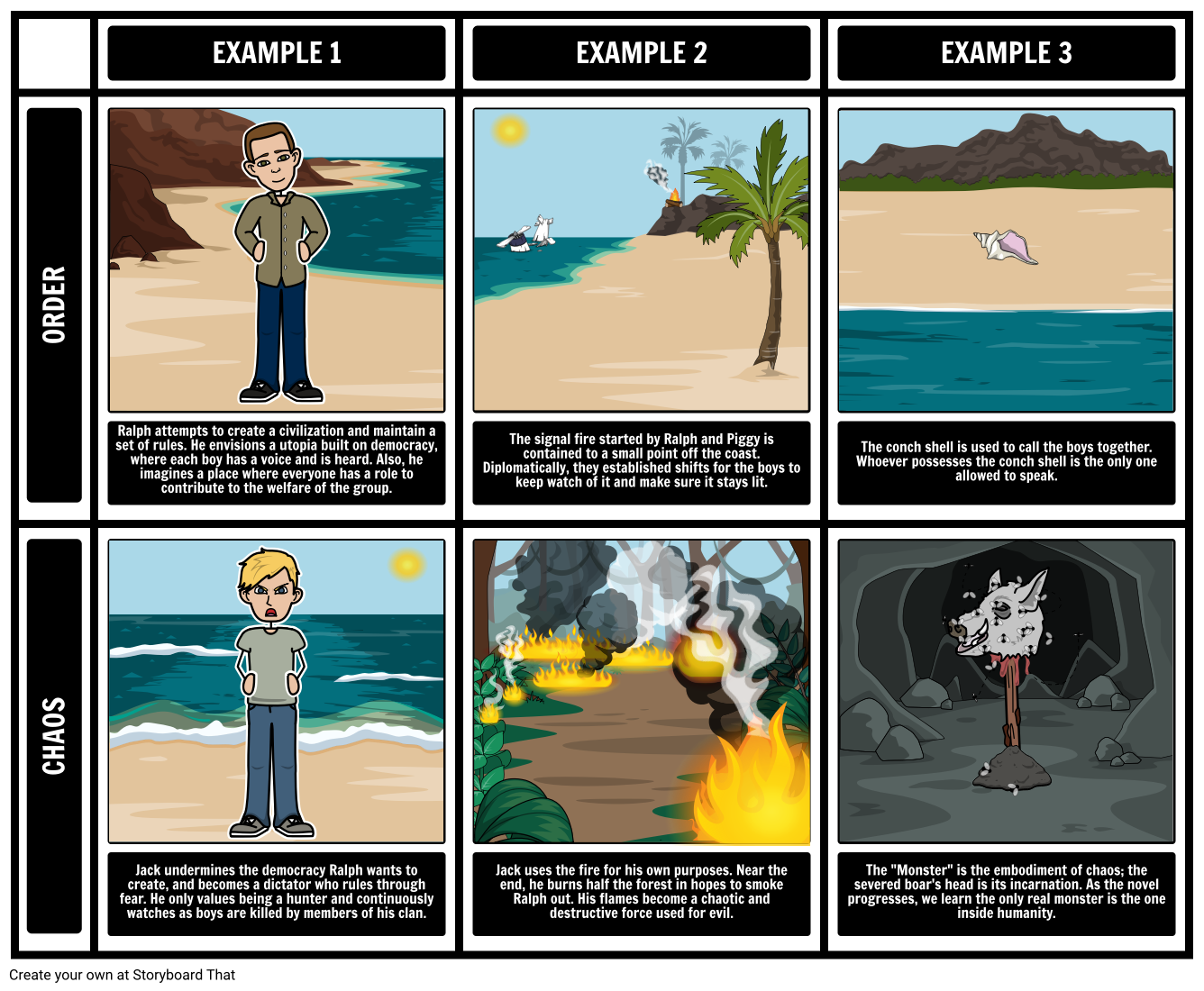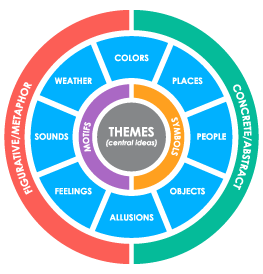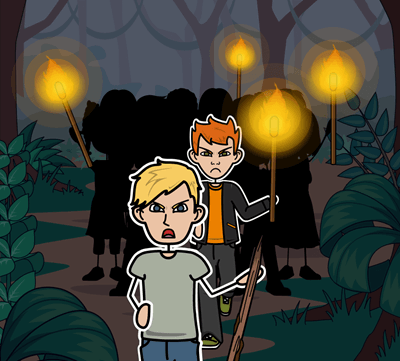Activity Overview
Valuable aspects of any literary work are its themes, symbols, and motifs. However, abstract ideas are often difficult for students to anatomize without assistance. Using a storyboard, students can visually demonstrate their understanding of these concepts, and master analysis of literary elements. For best practices, see our article with specific lesson plan steps on setting up your classroom and activities to teach themes, symbols, and motifs.
In the classroom, students can track themes about civilization and morality.
Themes to Look For & Discuss
Order vs. Chaos
A common theme throughout Lord of the Flies is the fight of Order against Chaos. From the beginning, Ralph and Piggy attempt to create order, rules, and duties. However, Jack the leader of the hunters, becomes overcome by the savageness of his duties. The other boys on the island are divided. The more Ralph tries to restore order, the more fowl and ruthless Jack becomes. Fires devastate the island, boys are murdered, and eventually the chaos turns on Ralph as he becomes the hunted.
Loss of innocence
Prior to being stranded on the island, the boys attended a prestigious school, and were being evacuated due to the chaos of a nuclear war. Only being children, their lives were full of innocence. However, when they land on the island free from laws, rules, and adults, they must struggle for survival, and against each other.
Symbols and Motifs
The Conch
This large seashell represents the only real order that the boys have in their camps. When Piggy and Ralph first find the shell, it is used to call the other boys and establish rules for government. As the novel progresses, the conch loses power as chaos and instability take over. When the boulder is rolled onto Piggy (killing him), it also destroys the conch.
The Monster
The monster on the island was imagined by the sacred younger boys. It is their belief in the idea that gives power to it and turns it into a reality. Although there is no monster, it becomes apparent they should worry about the monsters within each of them.
The "Lord of the Flies"
The hunting party lead by Jack returns with a kill, a wild boar. The group comes up with the idea to leave the severed pigs head on a stake in the woods as a gift to the island gods. As it begins to rot, it becomes infested with flies. A young boy named Simon stumbles upon it in the woods and believes he has a conversation with it. It becomes the manifestation of the island monster, and symbolizes evil. In their conversation, the head tells Simon it intends on having fun with him and that all evil lies within us.
Template and Class Instructions
(These instructions are completely customizable. After clicking "Copy Activity", update the instructions on the Edit Tab of the assignment.)
Student Instructions
Create a storyboard that identifies recurring themes in Lord of the Flies. Illustrate instances of each theme and write a short description below each cell.
- Click "Start Assignment".
- Identify the theme(s) from Lord of the Flies you wish to include and replace the "Theme 1" text.
- Create an image for the example(s) that represents this theme.
- Write a description of each of the examples.
Lesson Plan Reference
- CCSS: RL.9-10.1 - Cite strong and thorough textual evidence to support analysis of what the text says explicitly as well as inferences drawn from the text
- CCSS: RL.9-10.3 - Analyze how complex characters (e.g., those with multiple or conflicting motivations) develop over the course of a text, interact with other characters, and advance the plot or develop the theme
- CCSS: RL.9-10.5 - Analyze how an author’s choices concerning how to structure a text, order events within it (e.g., parallel plots), and manipulate time (e.g., pacing, flashbacks) create such effects as mystery, tension, or surprise
Rubric
(You can also create your own on Quick Rubric.)
| Proficient | Emerging | Beginning | Needs Improvement | |
|---|---|---|---|---|
| Identification of Theme(s), Symbol(s), and/or Motif(s) | All themes are correctly identified as important recurring topics or messages in the story. Symbols are correctly identified as objects that represent something else at a higher level in the story. Motifs are correctly identified as important recurring features or ideas in the story. | Most themes are correctly identified, but others are missing or incomplete. Most symbols are correctly identified, but some objects are missing or incomplete. Some motifs are correctly identified, but others are missing or incomplete. | Most themes are missing, incomplete, or incorrect. Most symbols are missing, incomplete, or incorrect. Most motifs are missing, incomplete, or incorrect. | No themes, symbols, or motifs are correctly identified. |
| Examples and Descriptions | Quotes and examples are accurate to the theme(s), symbol(s), and/or motif(s) that are being identified. Descriptions accurately explain the theme(s), symbol(s), and/or motif(s) and highlight their significance to the story. | Most quotes and examples are accurate to the theme(s), symbol(s), and/or motifs that are being identified. Descriptions mostly accurately explain the theme(s), symbol(s), and/or motif(s), and highlight their significance to the story. | Most quotes and examples are minimal, incorrect, or unrelated to the theme(s), symbol(s), and/or motif(s) that are being identified. Descriptions contain inaccuracies in their explanations, or do not highlight their significance to the story. | Examples and descriptions are missing or too minimal to score. |
| Depiction | Depictions chosen for theme(s), symbol(s), and/or motif(s) are accurate to the story and reflect time, effort, thought, and care with regard to placement and creation of the scenes. | Depictions chosen for theme(s), symbol(s), and/or motif(s) are mostly accurate to the story. They reflect time and effort put into placement and creation of the scenes. | Depictions chosen for theme(s), symbol(s), and/or motif(s) are inaccurate to the story. The depictions may be rushed or show minimal effort, time, and care put into placement and creation of the scenes. | Most depictions are missing too many elements or are too minimal to score. Little time or effort has been put into placement and creation of the scenes. |
| English Conventions | There are no errors in spelling, grammar, or mechanics throughout the storyboard. All writing portions reflect careful proofreading and accuracy to the story. | There are a few errors in spelling, grammar, and mechanics throughout the storyboard. All writing portions show accuracy to the story and some proofreading. | There are several errors in spelling, grammar, and mechanics throughout the storyboard. Most writing portions do not reflect proofreading or accuracy to the story. | Errors in spelling, grammar, and mechanics in writing portions of the storyboard seriously interfere with communication. |
Activity Overview
Valuable aspects of any literary work are its themes, symbols, and motifs. However, abstract ideas are often difficult for students to anatomize without assistance. Using a storyboard, students can visually demonstrate their understanding of these concepts, and master analysis of literary elements. For best practices, see our article with specific lesson plan steps on setting up your classroom and activities to teach themes, symbols, and motifs.
In the classroom, students can track themes about civilization and morality.
Themes to Look For & Discuss
Order vs. Chaos
A common theme throughout Lord of the Flies is the fight of Order against Chaos. From the beginning, Ralph and Piggy attempt to create order, rules, and duties. However, Jack the leader of the hunters, becomes overcome by the savageness of his duties. The other boys on the island are divided. The more Ralph tries to restore order, the more fowl and ruthless Jack becomes. Fires devastate the island, boys are murdered, and eventually the chaos turns on Ralph as he becomes the hunted.
Loss of innocence
Prior to being stranded on the island, the boys attended a prestigious school, and were being evacuated due to the chaos of a nuclear war. Only being children, their lives were full of innocence. However, when they land on the island free from laws, rules, and adults, they must struggle for survival, and against each other.
Symbols and Motifs
The Conch
This large seashell represents the only real order that the boys have in their camps. When Piggy and Ralph first find the shell, it is used to call the other boys and establish rules for government. As the novel progresses, the conch loses power as chaos and instability take over. When the boulder is rolled onto Piggy (killing him), it also destroys the conch.
The Monster
The monster on the island was imagined by the sacred younger boys. It is their belief in the idea that gives power to it and turns it into a reality. Although there is no monster, it becomes apparent they should worry about the monsters within each of them.
The "Lord of the Flies"
The hunting party lead by Jack returns with a kill, a wild boar. The group comes up with the idea to leave the severed pigs head on a stake in the woods as a gift to the island gods. As it begins to rot, it becomes infested with flies. A young boy named Simon stumbles upon it in the woods and believes he has a conversation with it. It becomes the manifestation of the island monster, and symbolizes evil. In their conversation, the head tells Simon it intends on having fun with him and that all evil lies within us.
Template and Class Instructions
(These instructions are completely customizable. After clicking "Copy Activity", update the instructions on the Edit Tab of the assignment.)
Student Instructions
Create a storyboard that identifies recurring themes in Lord of the Flies. Illustrate instances of each theme and write a short description below each cell.
- Click "Start Assignment".
- Identify the theme(s) from Lord of the Flies you wish to include and replace the "Theme 1" text.
- Create an image for the example(s) that represents this theme.
- Write a description of each of the examples.
Lesson Plan Reference
- CCSS: RL.9-10.1 - Cite strong and thorough textual evidence to support analysis of what the text says explicitly as well as inferences drawn from the text
- CCSS: RL.9-10.3 - Analyze how complex characters (e.g., those with multiple or conflicting motivations) develop over the course of a text, interact with other characters, and advance the plot or develop the theme
- CCSS: RL.9-10.5 - Analyze how an author’s choices concerning how to structure a text, order events within it (e.g., parallel plots), and manipulate time (e.g., pacing, flashbacks) create such effects as mystery, tension, or surprise
Rubric
(You can also create your own on Quick Rubric.)
| Proficient | Emerging | Beginning | Needs Improvement | |
|---|---|---|---|---|
| Identification of Theme(s), Symbol(s), and/or Motif(s) | All themes are correctly identified as important recurring topics or messages in the story. Symbols are correctly identified as objects that represent something else at a higher level in the story. Motifs are correctly identified as important recurring features or ideas in the story. | Most themes are correctly identified, but others are missing or incomplete. Most symbols are correctly identified, but some objects are missing or incomplete. Some motifs are correctly identified, but others are missing or incomplete. | Most themes are missing, incomplete, or incorrect. Most symbols are missing, incomplete, or incorrect. Most motifs are missing, incomplete, or incorrect. | No themes, symbols, or motifs are correctly identified. |
| Examples and Descriptions | Quotes and examples are accurate to the theme(s), symbol(s), and/or motif(s) that are being identified. Descriptions accurately explain the theme(s), symbol(s), and/or motif(s) and highlight their significance to the story. | Most quotes and examples are accurate to the theme(s), symbol(s), and/or motifs that are being identified. Descriptions mostly accurately explain the theme(s), symbol(s), and/or motif(s), and highlight their significance to the story. | Most quotes and examples are minimal, incorrect, or unrelated to the theme(s), symbol(s), and/or motif(s) that are being identified. Descriptions contain inaccuracies in their explanations, or do not highlight their significance to the story. | Examples and descriptions are missing or too minimal to score. |
| Depiction | Depictions chosen for theme(s), symbol(s), and/or motif(s) are accurate to the story and reflect time, effort, thought, and care with regard to placement and creation of the scenes. | Depictions chosen for theme(s), symbol(s), and/or motif(s) are mostly accurate to the story. They reflect time and effort put into placement and creation of the scenes. | Depictions chosen for theme(s), symbol(s), and/or motif(s) are inaccurate to the story. The depictions may be rushed or show minimal effort, time, and care put into placement and creation of the scenes. | Most depictions are missing too many elements or are too minimal to score. Little time or effort has been put into placement and creation of the scenes. |
| English Conventions | There are no errors in spelling, grammar, or mechanics throughout the storyboard. All writing portions reflect careful proofreading and accuracy to the story. | There are a few errors in spelling, grammar, and mechanics throughout the storyboard. All writing portions show accuracy to the story and some proofreading. | There are several errors in spelling, grammar, and mechanics throughout the storyboard. Most writing portions do not reflect proofreading or accuracy to the story. | Errors in spelling, grammar, and mechanics in writing portions of the storyboard seriously interfere with communication. |
How To Compare and Contrast Themes in Lord of the Flies
Introduce Themes
Introduce students to the concept of themes and explain that themes are the central ideas around which the story revolves. Teachers can also discuss themes as the backbone of the story and how without them, there will be no meaning in any story. To further clarify the concept, give examples of themes from some famous stories that students are aware of.
Identify and Select Themes
After students are familiar with the concept of themes, help them identify several themes from the story. Ask them to list down these themes and select any two for comparison. The conflict between civilization and barbarism, order and chaos, the loss of innocence, strength and authority, and the inherent evil in human nature are some of the common themes in the story that students can compare.
Use a Venn Diagram
To graphically illustrate the comparison and contrast of the chosen topics, ask the students to use a Venn diagram or a table. Label the first theme on one side, the second theme on the other, and the intersection of the two themes on the overlapping part. Students can easily separate similarities and differences using this diagram.
Connect to the General Lesson
Think about the message that the author is attempting to express using these topics. How do they add to the broader remark or message about society and human nature? Students can use a more holistic approach and try to analyze the themes based on connection with the moral lesson.
Frequently Asked Questions About Lord of the Flies Themes, Symbols, and Motifs
What are the "Lord of the Flies" novel's key themes?
The conflict and difference between civilization and savagery, order and chaos, the loss of innocence, the corrupting effect of authority, and the underlying evil in human nature are among the key themes in "Lord of the Flies." Students can analyze these themes by conducting some research on past and present civilizations and how some civilizations emerged and crumbled.
How does the book's theme of civilization against barbarism manifest itself?
The young boys' fight to uphold order and create standards contrasts with their decline into aggressive, primitive behavior as they lose their connection to civilization, illustrating the topic of civilization vs. barbarism. It also signifies the actions human beings will take in order to survive in a dystopian world.
How does the story employ the motif of shadows and darkness?
Darkness and shadows serve as a metaphor for the island's increasingly violent, frightful, and wicked atmosphere. It depicts the boys' internal conflicts and the rising danger they are in.
More Storyboard That Activities
Lord of the Flies
Introductory School Offer
ONLY$500
- 1 School
- 5 Teachers for One Year
- 1 Hour of Virtual PD
30 Day Money Back Guarantee • New Customers Only • Full Price After Introductory Offer • Access is for 1 Calendar Year
© 2025 - Clever Prototypes, LLC - All rights reserved.
StoryboardThat is a trademark of Clever Prototypes, LLC, and Registered in U.S. Patent and Trademark Office










